New Zealand youth-led project awarded grant by UNESCO and SEVENTEEN
A youth-led New Zealand project is among 100 global projects which have been awarded a financial grant by UNESCO and K-pop icons and UNESCO Goodwill Ambassadors SEVENTEEN.
Refugee Youth Active and Empowered
Named Goodwill Ambassador for Youth in July 2024, the world-famous group SEVENTEEN has joined UNESCO’s efforts to support young people in implementing impactful solutions for themselves and their communities.
The projects, representing 70 countries, were selected by an international jury for their potential to drive change, build creative communities, or improve young peoples’ mental health and well-being. The majority of the projects will work through music, sports and the arts.
The New Zealand project chosen is the Refugee Youth Active and Empowered initiative. Designed by and for refugee youth, this programme uses physical activities to empower young refugees from regional New Zealand.
“Refugee youth in smaller regions of New Zealand face higher levels of social exclusion, racism, and limited access to recreational opportunities, then their counterparts in larger cities. They struggle with cultural and linguistic barriers, often feeling disconnected from their communities and unable to participate in mainstream sports,” says Yibeth Morales Ayala, who is leading the project.
To address these challenges, Refugee Youth Active and Empowered will begin with a sport leadership summer camp, introducing participants - many of whom have never had the opportunity to engage in organised sports - to activities such as football, kayaking, tennis, swimming, hiking, and traditional games from their home countries.
These activities will provide participants with opportunities to build leadership, teamwork, and communication skills while fostering a sense of belonging.
“After the camp, we will provide ongoing support to ensure refugee youth remain engaged with local sports and activities, creating lasting connections within their communities. This includes working with local clubs, advocating for more inclusive sports programmes, and providing mentoring to help them navigate barriers to participation,” says Yibeth.
The funding from UNESCO is instrumental in helping the project to break down the systemic barriers that refugee youth face, provide youth with safe and positive recreational opportunities, and empower them to take leadership roles within their communities.
“Most importantly, it will give them the opportunity to build confidence, form lasting friendships, and feel a true sense of belonging in New Zealand,” says Yibeth.
The financial grants – ranging between 5000 and 7500 USD – enable the winners to implement their innovative projects at national or community levels until October 2025.
In addition to financial support, UNESCO and SEVENTEEN will provide project management training, and mentorship for the winners. The training programme will be led by social innovation experts, who will also help identify mentors from various professional backgrounds. The winners are also engaged in co-creating the training programme.
“The creative spirit and sense of responsibility that permeate these youth-led projects have been an inspiration to us all. We are excited to see how the collective experience will help build youth communities and empower many more like ourselves to achieve their dreams," said SEVENTEEN.

